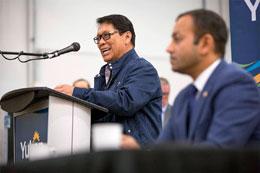B.C., Yukon eye Filipinos to ease labour shortage

The Philippine Overseas Employment Administration (POEA) has announced that two labour deals with Canadian provinces will mean thousands of jobs for its nationals in the coming years.
The agency tasked to look after expat Filipino workers, is now fast tracking the agreement between the provinces and the federal government of Canada to process the applications.
Philippine Labour Secretary Silvestre Bello III also said that Slovenia was seeking Philippine approval for the deployment of up to 5,000 skilled and semi-skilled labor to supplement their workforce.
Jobs open to Filipinos include healthcare workers, nurses, engineers, truck drivers, heavy machine and equipment operators, household service and other industries.
“There is already an agreement...it will be a government-to-government track and it's being prepared...we're finalising the bilateral labour agreements,” POEA Administrator Bernard Olalia told Philippine media in Filipino language. "Then, we will be ready to start the deployment."
Canada has the fourth-highest total estimated value of natural resources, valued at US$33.2 trillion in 2016. The country has a $50,725 GDP per capital in 2019 (estimate).
As of April 2018, there are a total of 901,218 Filipinos in Canada (or 2.6% of Canada’s national population) who came to the country as temporary foreign workers (TFWs), permanent residents, or naturalized Canadians.
Today, the Philippines continues to be a leading source of immigrants to Canada, followed by India, China, and Iran.
Most Filipinos initially work in Canada as temporary foreign workers, and then apply for a permanent resident status once they get the opportunity.
In 2017 alone, remittances from Filipinos in Canada increased by 12.6% (from USD 572,820,000 in 2016 to USD 644,754,000 in 2017).
Last August Bello signed a letter of intent which is to help create a more streamlined process under the Yukon Nominee Program to help address the territory’s labour shortage.
As many as 2,000 Filipino nurses and skilled workers can be hired in Canada’s Yukon territory every year under this deal.
The letter of intent outlines plans to establish a framework for negotiations on immigration programs and cooperation on human resource development between the Philippines and the territory.
Negotiations would deal with matters such as matching Filipino workers with employment opportunities in the Yukon under the Yukon Nominee Program; system enhancements for the recruitment, protection and placement of Filipino workers in the territory; and a public information campaign on the Yukon Nominee Program.
Yukon’s Economic Development Minister Ranj Pillai said approximately 40 per cent of those coming to the Yukon to work through the nominee program come from the Philippines.
Bello said following the Yukon deal, British Columbia is also looking to sign a new bilateral labor agreement with the country to hire skilled Filipino workers.
Upon signing, it will be the second labor accord of British Columbia with the country since it forged a memorandum of understanding with the Philippine government in 2008 for cooperation on Human Resources Development and Deployment.
Bello said the proposed bilateral labor agreement of British Columbia will be similar to what they are currently forging with the Canadian territory of Yukon.
There is an estimated 10 million Filipinos—roughly a tenth of the country’s population—who work overseas as a way of escaping unemployment, low wages, and limited opportunities at home.
The money sent back by overseas Filipino workers (known as OFWs) amounts to $31 billion a year—about 10 percent of the Philippines’ gross domestic product.
Meanwhile, the Philippines is moving towards setting up a a department fully devoted to addressing the needs of overseas Filipino workers.
“One of the main issues against the establishment of the Department of OFWs is funding or the cost it would entail in creating a new office. But why would we look at the cost?” lawmaker Rep. Fidel Nograles of Rizal asked.
“If we are talking about money, then our primary consideration should be the dollars they have been remitting to their families. They have been our unsung heroes for the longest time now. Don’t they deserve something better? Can we not help them?” he pointed out.
Nograles is among the more than 30 lawmakers who have filed a bill at the House of Representatives for the establishment of a Department of OFWs. A technical working group had been created to iron out the various bills’ key provisions. He has urged his colleagues to prioritize the creation of and funding for the department.
The World Bank’s April 2019 Migration and Development Brief reported that the Philippines was the fourth biggest recipient of migrant worker remittances worldwide, behind India’s $78.6 billion, China’s $67.4 billion, and Mexico’s $35.7 billion.
House Deputy Speaker LRay Villafuerte, another author of the measure, said problems perennially besetting the families of about more than 10 million OFWs across the globe might finally have some kind of resolution once the bill becomes law.
He added that this is the chamber’s way of “recognizing” the vital contribution to the domestic economy of the ever-increasing number of OFWs “who are our modern-day heroes.”
The Bangko Sentral ng Pilipinas records showed that the OFW remittances from January to May this year soared to $13.7 billion or 4.1 percent higher than the same period in 2018.
“I have been with President Duterte in many of his official trips abroad and I have personally seen how our OFWs love our President,” Villafuerte stressed.
“President Duterte has heard many stories about the hardships of our countrymen while working abroad and I understand why he wants Congress to speed up the passage of a measure creating an OFW department.”









